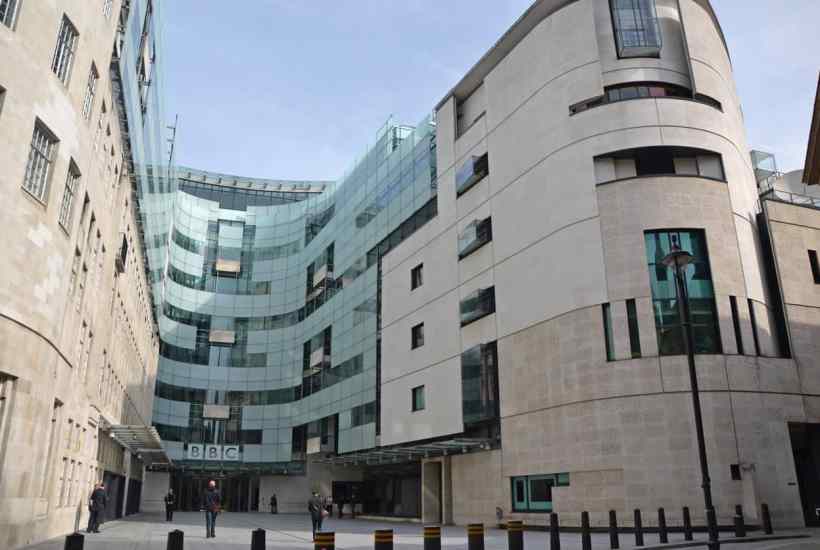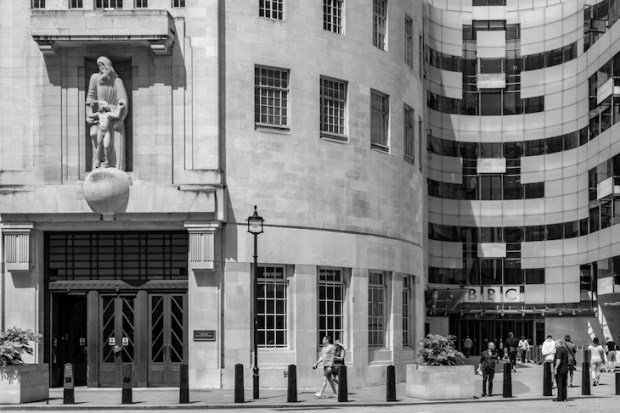As a journalist, it’s never a comfortable feeling when the news organisation you work for becomes the story. But with No. 10 desperate to throw some ‘red meat’ to the green benches — to take the spotlight off the rotting carcass of ‘partygate’ — it was inevitable that the BBC would end up being fed through the mincer this week.
The Culture Secretary, Nadine Dorries, lit the touch-paper by announcing on social media (where else?) that the latest BBC licence fee announcement would ‘be the last’, adding with provocative hyperbole that ‘the days of the elderly being threatened with prison sentences and bailiffs knocking on doors’ were over.
Up until then, social media had been awash with calls for Boris Johnson to step down. Satisfyingly for the orchestrators of ‘Operation Save Big Dog’, many of the usual suspects took the bait and leapt to the defence of the BBC . Writing on Twitter, Gary Lineker described it as ‘the most treasured of national treasures’. What the goal-poacher-turned-presenter didn’t mention was the treasure he takes away from the Corporation. As its highest-paid star, 8,176 licence fees were required to cover Lineker’s £1.3 million salary last year alone. Back of the net!
When Dorries rose in the Commons to confirm the licence fee would be frozen for two years, journalists across the newsroom at New Broadcasting House watched with shaking heads and pursed lips. Much of the commentary wasn’t complimentary. One wag remarked that putting Nadine Dorries in charge of culture was like appointing a bull as Secretary of State for fine bone china.
The gallows humour masked a bitter reality for the backroom staff of the BBC’s news output. Dorries was sticking the boot in after a decade during which the broadcaster has implemented wave after wave of job cuts, with the management mantra of ‘doing more with less’ roughly translating into ‘work harder as we squeeze pay packets and pensions’. Having survived a good number of these rounds of cuts, I’ve noticed the axe never seems to fall on the endless tiers of management but on the modestly-paid teams who actually keep programmes on air. It’s no wonder experienced journalists are leaving in droves and morale is low.
BBC Breakfast’s Dan Walker, however, always appears upbeat, and no wonder: his pay jumped last year to almost £300,000. He posted an image online showing the many services the Beeb provides for only ‘43p a day’. But Walker’s defence of his employer — that it represents great value for money — misses the point. Much of the fury directed against the BBC is because people are compelled by law to pay for it, whether they like it or not. And while parts of the Corporation are surely deserving of public funds, shouldn’t hard-pressed families be able to choose whether they contribute to Walker’s six-figure salary and Lineker’s millions?
Regrettably, the ability to exercise choice in a free society is a priceless value that the BBC has given up trying to defend. Indeed, as I have argued here before, it has been actively pressuring its audiences to relinquish personal agency and comply with state diktats throughout most of the pandemic. This position would perhaps be defensible if the BBC’s health correspondents had scrutinised these government decrees, evaluating their potential for immediate and future collateral damage, but they didn’t even seem to try. In a grim irony, it took the alleged rule-breaking at Downing Street to force the BBC to look the horrors of lockdown in the face.
ITV landed the big ‘partygate’ scoop: a copy of a damning email inviting more than 100 staff to a drinks event in the garden of No. 10 at the height of lockdown. The following morning Radio 5Live’s phone-in heard from caller after caller recounting how fastidiously they had adhered to the rules around the time the wine-fuelled ‘work event’ had taken place. The stories they told were both heart-breaking and deeply troubling at the same time.
‘Dave in Bolton’ told the presenter Nicky Campbell that his youngest daughter, who was suffering from a terminal brain tumour, was put into isolation in hospital after she’d tested positive for Covid. Partially deaf and unable to speak due to a seizure, she was denied visits from her parents for ten days. ‘Lydia’ described an emergency C-section to deliver her overdue baby. Despite the fact she was feeling fragile and traumatised, her husband was ‘kicked out’ of the hospital soon after the baby’s arrival and barred from comforting his wife in person, or seeing his infant child, for the next three days. She told Campbell it was ‘a really horrific experience’.
The day after Boris Johnson’s carefully-worded apology in the Commons, BBC Breakfast continued the theme with an interview with Hannah Brady. Her father, Shaun, died days before the Downing Street garden party. She described the funeral. It was held outside. Only ten mourners were allowed to attend in person. They had to be socially distanced. No one could touch the coffin. The vicar said the funeral’s duration had to be ‘20 minutes, tops’, five minutes less than Boris Johnson spent at the now notorious ‘bring your own booze’ bash.
An elephant loomed in the studios during these distressing broadcasts: it wasn’t the cavalier interpretation of the rules by our chaotic and contradictory PM and his frazzled staff that caused these people to have suffered such unspeakably awful experiences – it was the rules themselves.
Hearing of parties at No. 10 undoubtedly rubbed salt in people’s wounds but these wounds were not caused by ‘partygate’. This wasn’t acknowledged by a single BBC presenter. How could it be? Throughout the pandemic, the BBC has used its platforms to proselytise about every Covid rule and restriction, inducing the public to see unquestioning compliance as a virtue and dissent as sociopathic selfishness.
And this slanted stance continues, evidenced by the BBC’s recent coverage of Novak Djokovic’s ordeal at the hands of the Australian authorities. Djokovic was characterised as the villain rather than a victim. And while much was said of the tennis player’s eccentric attitudes towards vaccinations, reporters displayed a marked reluctance to question the ethics of Canberra’s Covid zealotry or the longer-term implications for international sport, travel and bodily autonomy in general.
Talking to colleagues about the tennis player’s plight gave an insight into the Covid groupthink endemic in BBC offices. One called him ‘an idiot’ for declining a coronavirus jab. Another showed barely contained contempt for the unvaccinated, making clear they would welcome any measures that excluded those who decline jabs from wider society.
At times like these I find myself reeling. The human rights group Liberty describes immunity passports as ‘an overreach on our rights’ that would push ‘the most marginalised into an even more precarious position’. Yet, like Democrats in the US, Covid has somehow turned the BBC’s ‘metropolitan lefties’ into full-throated supporters of measures they would have described as ‘fascist’ only a couple of years ago.
There was one piece of BBC output that bucked this trend. Discussing the Djokovic case, Radio 4’s World at One aired an interview with the former Olympic swimmer Sharron Davies who said she understood why some athletes might be reluctant to have a Covid jab. She cited the example of a friend who had been hospitalised after a booster shot had triggered the symptoms of a stroke – the same friend’s son, a young cyclist, had also suffered an adverse reaction to his first jab and was unable to train for some time afterwards. The presenter correctly pointed out that such adverse reactions were rare but she at least let Davies speak. This was the first occasion I had heard someone talk about vaccine side-effects on the BBC without the conversation being shut down — an exception that speaks volumes.
When it comes to the coverage of ‘partygate’, I find myself wincing at the level of hypocrisy shown, not just by Boris — but by the BBC. It’s pretty clear the PM didn’t want to go down the route of lockdown rules and restrictions. He sowed the seeds of his own destruction and the misery of millions when he bowed to pressure from panic-stricken advisers who had convinced themselves that the repressive example of Communist China must be followed. Once this route had been taken, BBC correspondents pressured the government to go further and further, obsessing over the details of how to correctly follow every rule to the letter, irrespective of the impact on transmission.
The reality is Downing Street staffers were much safer drinking booze in the garden of No. 10 at the height of lockdown than they were at their desks inside stuffy offices – and about as likely to catch coronavirus outdoors, under the disinfectant of blistering sunshine, as Nadine Dorries is to catch a plane to Honolulu to enjoy a girlie holiday with Laura Kuenssberg. But the BBC can’t admit this because by doing so it would have to concede that by throwing its full weight behind the lockdown approach, it too should bear responsibility for the harms it caused.
The party may be over for Boris Johnson but when it comes to taking a balanced approach to news coverage — and thus maintaining the public support it needs to survive — the BBC, like the PM, may have passed the point of no return.
Got something to add? Join the discussion and comment below.
Get 10 issues for just $10
Subscribe to The Spectator Australia today for the next 10 magazine issues, plus full online access, for just $10.



















Comments
Don't miss out
Join the conversation with other Spectator Australia readers. Subscribe to leave a comment.
SUBSCRIBEAlready a subscriber? Log in